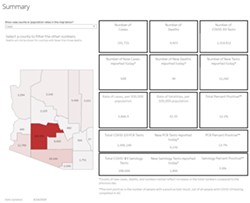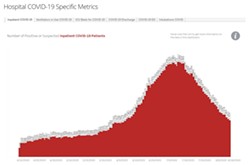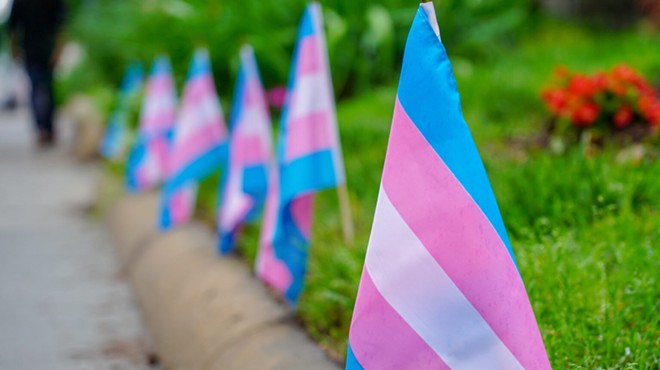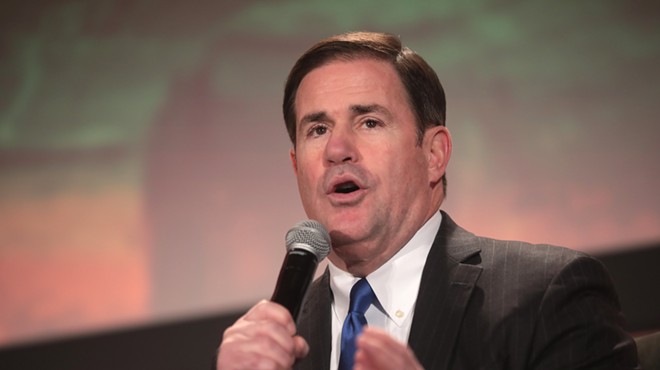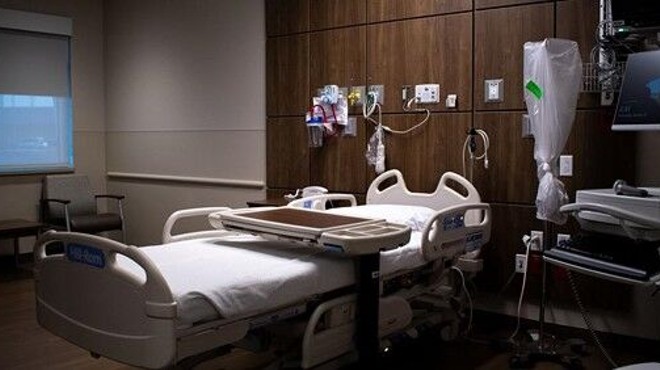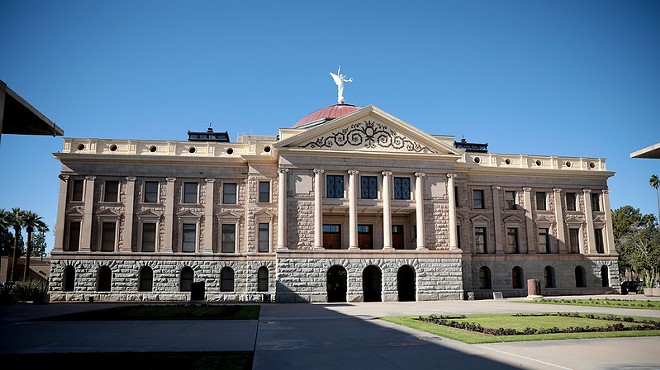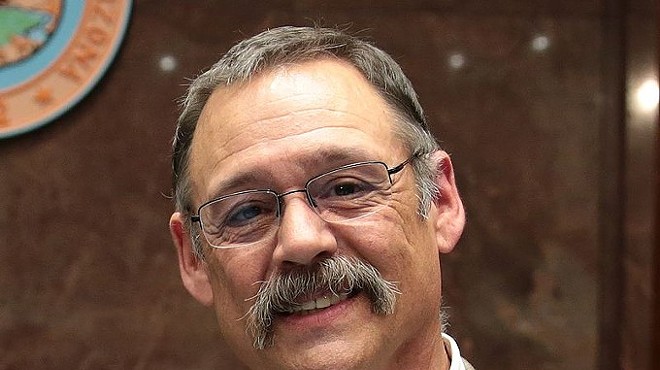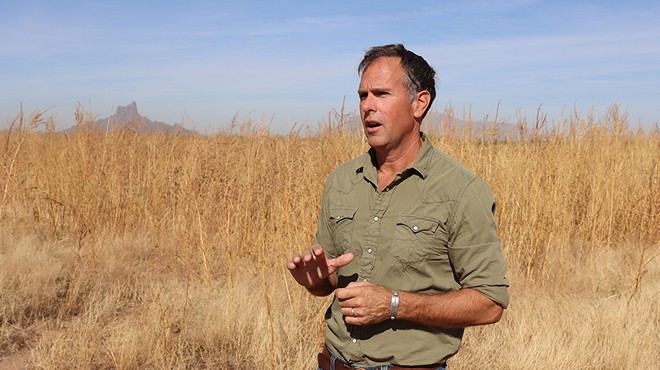Friday, August 14, 2020
Your Southern AZ COVID-19 Roundup for Friday, Aug. 14: Total Cases Top 191K; Pop-Up Testing in Green Valley Today; Tucson Offering Grants to Families Affected by COVID
The number of Arizona’s confirmed novel coronavirus cases topped 191,000 as of Friday, Aug. 14, according to the Arizona Department of Health Services.
Pima County had seen 19,164 of the state’s 191,721 confirmed cases.
A total of 4,423 Arizonans had died after contracting COVID-19, according to the Aug. 14 report.
The number of hospitalized COVID cases continues to decline. ADHS reported that as of Aug. 13, 1,359 COVID patients were hospitalized in the state, down from a peak of 3,517 on July 13.
A total of 1,037 people visited ERs on Aug. 13 with COVID symptoms. That number peaked at 2,008 on July 7.
A total of 473 COVID-19 patients were in ICU beds on Aug. 10. The number in ICUs peaked at 970 on July 13.
Pima County sees downward trend in cases following mask mandate
Following the passage of an ordinance on June 19 requiring people to wear masks when out in public, Pima County has seen a dramatic drop in the number of new positive COVID-19 tests.
The number of cases dropped from a high of 2,368 new cases in the week ending July 4 to just 865 in the week ending Aug. 1, according to a Pima County Health Department report.
Fewer people are dying as well. Deaths related to COVID-19 peaked the week of July 4 with 51 people. The week ending Aug. 1, Pima County saw just 20 deaths.
City of Tucson offering grants to residents impacted by COVID crisis
In response to the COVID-19 pandemic, the City of Tucson received about $95 million from the federal CARES Act. Mayor Regina Romero and the city council members recently approved $3 million of that funding to be distributed to local workers and families that have been negatively impacted by the crisis.
The grant program, named the “We Are One | Somos Unos Resiliency Fund” will focus on individuals and households that have not received any state or federal COVID-19 relief money and whose income does not reach Pima County’s self-sufficiency standard.
The self-sufficiency standard measures how much money an individual or family needs to earn to be able to meet their basic needs with no public or private financial assistance. In 2018, the self-sufficiency standard for a single adult in Pima County was $9.66 per hour or $1,700 per month. For a household with two adults and two young children, the standard was $13.22 per hour for both adults, or $4,711 per month.
On July 24, the expanded federal unemployment benefits that were provided in response to COVID-19 expired, leaving many households across the country vulnerable to financial instability.
The City of Tucson is partnering with the Women’s Foundation of Southern Arizona, who will administer the grants and begin accepting applications at 10 a.m. on Wednesday, Aug. 19 until 5 p.m. on Wednesday, Sept. 9.
No in-person school or “learning centers” for awhile
The Pima County Department of Health told school districts this week that it remains too dangerous for students to return to schools in person.
As a result, Tucson Unified School District voted this week to change its plan to open “learning centers” in schools to give students who need a place to go during the day.
TUSD will have a limited number of spots for “at-risk” students “who require in-person support services.
Pima County rolled out pop-up testing sites this week
The Pima County Health Department has rolled out new pop-up COVID-19 testing sites that are available in areas of the county that have had limited testing availability.
Through their partnership with the Arizona Department of Emergency and Military Affairs, Pima County will offer a minimal contact testing operation for free at the following times and locations. Pre-registration is strongly encouraged and can be completed at www.pima.gov/covid19testing.
Today the pop-up testing will be in the Green Valley/Sahuarita area from 9 a.m. to 4 p.m. at the Green Valley Recreation Desert Hills Center, 2980 S. Camino Del Sol
Here are the upcoming locations:
Vail/Corona de Tucson
10 a.m. to 6 p.m. on Saturday, Aug. 15
Pima County Fairgrounds, 11300 S. Houghton Road
Oro Valley/Catalina
10 a.m. to 6 p.m. on Sunday, Aug. 16
Coronado K-8 School, 3401 E. Wilds Road
Greater Tucson Area
10 a.m. to 6 p.m. on Monday, Aug. 17
Rillito Racetrack, 4502 N. 1st Avenue
10 a.m. to 6 p.m. on Tuesday, Aug. 18
Sunnyside High School, 1725 E. Bilby Road
South Tucson
10 a.m. to 6 p.m. on Wednesday, Aug. 19
Tucson Rodeo Grounds, 4823 S. 6th Avenue
“This is an exciting development for COVID-19 testing,” Pima County Health Director Dr. Theresa Cullen said in a press release. “This unorthodox style allows us to get into communities that have not had easy or broad access to tests and get a better understanding of COVID-19 across the county.”
Participants can access their test results by logging into www.doineedacovid19test.com within a few days. The county expects to complete 20,000 tests through these events.
Pima County has teamed up with the City of Tucson to open a third testing center at the Udall Center, 7200 E. Tanque Verde Road. Tests are available Tuesday through Sunday, from 8 a.m. to 5 p.m.
The new center, which requires a nasal swab, joins a similar facility at Kino Event Center, 2805 E. Ajo Way. A third center at the northside Ellie Towne Center, 1660 W. Ruthrauff Road, involves a saliva test designed by ASU.
All three centers offer easy-to-schedule appointments—often with same-day availability—and you get results in less than 72 hours.
Schedule an appointment at pima.gov/covid19testing.
The centers are also tied into Pima County’s developing contact tracing operation, which aims to be able to identify potential clusters and warn people if they have been in contact with someone who is COVID-positive.
If you’re interested in a test to determine if you’ve already had COVID-19, the UA has expanded a free COVID-19 antibody testing program to include 15 new categories of essential workers considered at high risk for exposure. The antibody test, developed by researchers at UA Health Sciences, determines who has been exposed to and developed an immune response against COVID-19.
In addition to healthcare workers and first responders, the test program is now open to educators, childcare workers, agriculture, grocery and foodservice workers, hospitality employees, solid-waste collection workers, transportation services workers and members of the National Guard. More information and registration for the test is available at covid19antibodytesting.arizona.edu.
Pac 12 cancels fall sports
The Pac-12 Conference unanimously voted Tuesday to postpone all sports competitions through the rest of the year, with an eye toward pushing fall sports like football to the spring. The announcement, which was unveiled during a Zoom call by Commissioner Larry Scott, came hours after the Big Ten Conference announced a similar decision.
Scott laid out the conference's decision in a press release, saying the communal spread of the COVID-19 coronavirus was still too rampant to risk players' health.
"We will continue to monitor the situation and when conditions change we will be ready to explore all options to play in the new calendar year," Scott's statement to the media read.
During the call, Scott discussed his desire for all fall athletes to maintain their current year of eligibility, while maintaining their scholarships as well. Scott addressed the realities of the virus, saying that holding events in a "bubble," where student-athletes are isolated from the rest of a given campus, was not realistic.
"This was an extremely difficult decision that we know will have impacts on our fans and student-athletes," Scott said.
University of Arizona Athletics Director Dave Heeke said he and his staff supported the decision.
“This is an incredibly difficult outcome for the entire Wildcat Family of student-athletes, coaches, staff, alumni, and supporters," Heeke said in a prepared statement. "I have a great deal of empathy for these student-athletes and the impact this will have on them personally. Representing our University, community, and state in competition is the foundation of the mission of Arizona Athletics and the Wildcat Way. However, the endless hard work of our student-athletes, coaches, and staff in preparation for Fall seasons is something we can all be proud of. The work of everyone who represents the Wildcat Way over the last five months has been an outstanding display of unity and resiliency."
Ducey releases new metrics to guide reopenings of nightclubs, gyms and other shuttered biz
The Arizona Department of Health Services has outlined a new series of metrics that businesses such as nightclubs, gyms, and other gathering places will have to pass in order to reopen.
Representatives of bars, gyms and water parks have sued the state, saying they were unfairly forced to close by Gov. Doug Ducey.
The new metrics involved businesses that are likely to become COVID hotspots. Alarmed by Arizona’s rapid spread of the coronavirus, Gov. Doug Ducey ordered fitness centers, movie theaters, water parks, and tubing operations, and some bars to close. He also limited restaurants to 50 percent capacity and indoor and outdoor activities to fewer than 50 people.
After working with representatives from the affected industries, the Arizona Department of Health Services developed the new benchmarks, which define the spread of the coronavirus as minimal, moderate, and substantial.
Gyms must remain closed as long as the spread is substantial but can open 25 percent capacity once spread reaches a moderate level as long as they implement ADHS mitigation requirements. Once the spread reaches a minimal level, gyms can go to 50 percent occupancy.
Movie theaters, water parks, and tubing companies must remain closed as long as the spread is substantial but can open 50 percent capacity once spread reaches moderate or minimal levels as long as they implement ADHS mitigation requirements.
Bars and nightclubs that serve food must remain closed as long as the spread is substantial but can open 50 percent capacity once spread reaches moderate or minimal levels as long as they implement ADHS mitigation requirements.
Bars and nightclubs that don’t serve food must remain closed as long as the spread is substantial or moderate but can open 50 percent capacity once spread reaches moderate or minimal levels as long as they implement ADHS mitigation requirements.
—By Jim Nintzel with additional reporting from Kathleen B. Kunz, Austin Counts, Jeff Gardner, Christopher Boan, and Tara Foulkrod
Pima County had seen 19,164 of the state’s 191,721 confirmed cases.
A total of 4,423 Arizonans had died after contracting COVID-19, according to the Aug. 14 report.
The number of hospitalized COVID cases continues to decline. ADHS reported that as of Aug. 13, 1,359 COVID patients were hospitalized in the state, down from a peak of 3,517 on July 13.
A total of 1,037 people visited ERs on Aug. 13 with COVID symptoms. That number peaked at 2,008 on July 7.
A total of 473 COVID-19 patients were in ICU beds on Aug. 10. The number in ICUs peaked at 970 on July 13.
Pima County sees downward trend in cases following mask mandate
Following the passage of an ordinance on June 19 requiring people to wear masks when out in public, Pima County has seen a dramatic drop in the number of new positive COVID-19 tests.
The number of cases dropped from a high of 2,368 new cases in the week ending July 4 to just 865 in the week ending Aug. 1, according to a Pima County Health Department report.
Fewer people are dying as well. Deaths related to COVID-19 peaked the week of July 4 with 51 people. The week ending Aug. 1, Pima County saw just 20 deaths.
City of Tucson offering grants to residents impacted by COVID crisis
In response to the COVID-19 pandemic, the City of Tucson received about $95 million from the federal CARES Act. Mayor Regina Romero and the city council members recently approved $3 million of that funding to be distributed to local workers and families that have been negatively impacted by the crisis.
The grant program, named the “We Are One | Somos Unos Resiliency Fund” will focus on individuals and households that have not received any state or federal COVID-19 relief money and whose income does not reach Pima County’s self-sufficiency standard.
The self-sufficiency standard measures how much money an individual or family needs to earn to be able to meet their basic needs with no public or private financial assistance. In 2018, the self-sufficiency standard for a single adult in Pima County was $9.66 per hour or $1,700 per month. For a household with two adults and two young children, the standard was $13.22 per hour for both adults, or $4,711 per month.
On July 24, the expanded federal unemployment benefits that were provided in response to COVID-19 expired, leaving many households across the country vulnerable to financial instability.
The City of Tucson is partnering with the Women’s Foundation of Southern Arizona, who will administer the grants and begin accepting applications at 10 a.m. on Wednesday, Aug. 19 until 5 p.m. on Wednesday, Sept. 9.
No in-person school or “learning centers” for awhile
The Pima County Department of Health told school districts this week that it remains too dangerous for students to return to schools in person.
As a result, Tucson Unified School District voted this week to change its plan to open “learning centers” in schools to give students who need a place to go during the day.
TUSD will have a limited number of spots for “at-risk” students “who require in-person support services.
Pima County rolled out pop-up testing sites this week
The Pima County Health Department has rolled out new pop-up COVID-19 testing sites that are available in areas of the county that have had limited testing availability.
Through their partnership with the Arizona Department of Emergency and Military Affairs, Pima County will offer a minimal contact testing operation for free at the following times and locations. Pre-registration is strongly encouraged and can be completed at www.pima.gov/covid19testing.
Today the pop-up testing will be in the Green Valley/Sahuarita area from 9 a.m. to 4 p.m. at the Green Valley Recreation Desert Hills Center, 2980 S. Camino Del Sol
Here are the upcoming locations:
Vail/Corona de Tucson
10 a.m. to 6 p.m. on Saturday, Aug. 15
Pima County Fairgrounds, 11300 S. Houghton Road
Oro Valley/Catalina
10 a.m. to 6 p.m. on Sunday, Aug. 16
Coronado K-8 School, 3401 E. Wilds Road
Greater Tucson Area
10 a.m. to 6 p.m. on Monday, Aug. 17
Rillito Racetrack, 4502 N. 1st Avenue
10 a.m. to 6 p.m. on Tuesday, Aug. 18
Sunnyside High School, 1725 E. Bilby Road
South Tucson
10 a.m. to 6 p.m. on Wednesday, Aug. 19
Tucson Rodeo Grounds, 4823 S. 6th Avenue
“This is an exciting development for COVID-19 testing,” Pima County Health Director Dr. Theresa Cullen said in a press release. “This unorthodox style allows us to get into communities that have not had easy or broad access to tests and get a better understanding of COVID-19 across the county.”
Participants can access their test results by logging into www.doineedacovid19test.com within a few days. The county expects to complete 20,000 tests through these events.
Pima County has teamed up with the City of Tucson to open a third testing center at the Udall Center, 7200 E. Tanque Verde Road. Tests are available Tuesday through Sunday, from 8 a.m. to 5 p.m.
The new center, which requires a nasal swab, joins a similar facility at Kino Event Center, 2805 E. Ajo Way. A third center at the northside Ellie Towne Center, 1660 W. Ruthrauff Road, involves a saliva test designed by ASU.
All three centers offer easy-to-schedule appointments—often with same-day availability—and you get results in less than 72 hours.
Schedule an appointment at pima.gov/covid19testing.
The centers are also tied into Pima County’s developing contact tracing operation, which aims to be able to identify potential clusters and warn people if they have been in contact with someone who is COVID-positive.
If you’re interested in a test to determine if you’ve already had COVID-19, the UA has expanded a free COVID-19 antibody testing program to include 15 new categories of essential workers considered at high risk for exposure. The antibody test, developed by researchers at UA Health Sciences, determines who has been exposed to and developed an immune response against COVID-19.
In addition to healthcare workers and first responders, the test program is now open to educators, childcare workers, agriculture, grocery and foodservice workers, hospitality employees, solid-waste collection workers, transportation services workers and members of the National Guard. More information and registration for the test is available at covid19antibodytesting.arizona.edu.
Pac 12 cancels fall sports
The Pac-12 Conference unanimously voted Tuesday to postpone all sports competitions through the rest of the year, with an eye toward pushing fall sports like football to the spring. The announcement, which was unveiled during a Zoom call by Commissioner Larry Scott, came hours after the Big Ten Conference announced a similar decision.
Scott laid out the conference's decision in a press release, saying the communal spread of the COVID-19 coronavirus was still too rampant to risk players' health.
"We will continue to monitor the situation and when conditions change we will be ready to explore all options to play in the new calendar year," Scott's statement to the media read.
During the call, Scott discussed his desire for all fall athletes to maintain their current year of eligibility, while maintaining their scholarships as well. Scott addressed the realities of the virus, saying that holding events in a "bubble," where student-athletes are isolated from the rest of a given campus, was not realistic.
"This was an extremely difficult decision that we know will have impacts on our fans and student-athletes," Scott said.
University of Arizona Athletics Director Dave Heeke said he and his staff supported the decision.
“This is an incredibly difficult outcome for the entire Wildcat Family of student-athletes, coaches, staff, alumni, and supporters," Heeke said in a prepared statement. "I have a great deal of empathy for these student-athletes and the impact this will have on them personally. Representing our University, community, and state in competition is the foundation of the mission of Arizona Athletics and the Wildcat Way. However, the endless hard work of our student-athletes, coaches, and staff in preparation for Fall seasons is something we can all be proud of. The work of everyone who represents the Wildcat Way over the last five months has been an outstanding display of unity and resiliency."
Ducey releases new metrics to guide reopenings of nightclubs, gyms and other shuttered biz
The Arizona Department of Health Services has outlined a new series of metrics that businesses such as nightclubs, gyms, and other gathering places will have to pass in order to reopen.
Representatives of bars, gyms and water parks have sued the state, saying they were unfairly forced to close by Gov. Doug Ducey.
The new metrics involved businesses that are likely to become COVID hotspots. Alarmed by Arizona’s rapid spread of the coronavirus, Gov. Doug Ducey ordered fitness centers, movie theaters, water parks, and tubing operations, and some bars to close. He also limited restaurants to 50 percent capacity and indoor and outdoor activities to fewer than 50 people.
After working with representatives from the affected industries, the Arizona Department of Health Services developed the new benchmarks, which define the spread of the coronavirus as minimal, moderate, and substantial.
- Substantial spread is defined as more than 100 COVID cases per 100,000 of population, a positive COVID test rate of greater than 10 percent and greater than 10 percent of emergency room visits related to COVID-like symptoms.
- Moderate spread is defined as between 10 and 100 cases of COVID cases per 100,000 of population, a positive COVID test rate of 5 to 10 percent, and between 5 and 10 percent of emergency room visits related to COVID-like symptoms.
- Minimal spread is defined as less than 10 cases per 100,000 population, a positive test rate of less than 5 percent, and less than 5 percent of emergency room visits related to COVID-like symptoms.
Gyms must remain closed as long as the spread is substantial but can open 25 percent capacity once spread reaches a moderate level as long as they implement ADHS mitigation requirements. Once the spread reaches a minimal level, gyms can go to 50 percent occupancy.
Movie theaters, water parks, and tubing companies must remain closed as long as the spread is substantial but can open 50 percent capacity once spread reaches moderate or minimal levels as long as they implement ADHS mitigation requirements.
Bars and nightclubs that serve food must remain closed as long as the spread is substantial but can open 50 percent capacity once spread reaches moderate or minimal levels as long as they implement ADHS mitigation requirements.
Bars and nightclubs that don’t serve food must remain closed as long as the spread is substantial or moderate but can open 50 percent capacity once spread reaches moderate or minimal levels as long as they implement ADHS mitigation requirements.
—By Jim Nintzel with additional reporting from Kathleen B. Kunz, Austin Counts, Jeff Gardner, Christopher Boan, and Tara Foulkrod


